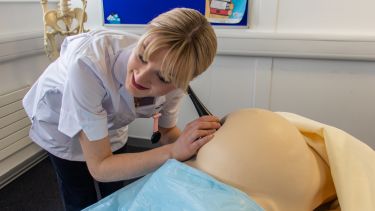The placements get you used to building a caseload of women

What made you want to train to be a Midwife and what drew you to this course?
“I did my undergraduate degree in medical biology and forensic toxicology, which I adored. I knew I wanted to stay in the science-healthcare world, but I also didn’t want to be stuck in a lab forever. I wanted to have more person-to-person interactions and talk to patients.
“The thing that attracted me to midwifery most was the autonomy - you get to make your own decisions and you’re more in charge of your practice. I’d spent time doing swabbing in an A&E department so I wasn’t going in blind. I went in knowing how the NHS works and what it's like at the moment.
“Initially I looked at studying Midwifery at Huddersfield - where I’d studied my undergraduate degree - but it would have required me to do a whole undergraduate course again.
The fact that Sheffield’s Midwifery course would give me a Masters level qualification was a big attraction. You also come out the other end prescriber-ready, which is a big thing for me.
Isabel Gatenby
What do you like most about the University of Sheffield?
“It was a big change for me going from a campus to a non-campus university. I’m used to putting on my university ‘hat’ and then taking it off when I leave campus. That said, the facilities at Sheffield are all in one area which is really helpful when I want to go in and study. I can still separate my home and work environment.
“The Students’ Union is brilliant too. I did sign language in my first term at the SU which I really enjoyed; I’m hoping it’ll help me with patients. There are so many different societies you can be part of too - I’m definitely signing up for pole dancing next year!”
What are you enjoying most about the course?
“I like that you’re able to go on placement early on, but with support. My placements are all in Rotherham - about 10 minutes from my house - and the midwife I’ve been working with has been very accommodating. So I like to watch a technique once, like a baby heel prick, watch it again in case I’ve missed anything, then have a go. My midwife has listened to how I like to learn and she puts that in.
“The placements also get you used to building a caseload of women. If you’re on placement at the time they’re having appointments then you get to see them whilst working under your midwife supervision. They become your patients too. My midwife gives me quite a lot of responsibility; she lets me run most of the appointments and do booking in. You’re also able to go out of university if there’s an important appointment or interesting case to see and reflect on."
I’ve just started on the labour ward and I saw a caesarean section on my first day, which was honestly the best thing ever. I had a great time supporting the mother through her caesarean.
Isabel Gatenby
“The academic staff are also really supportive of personal and school needs. They are accommodating if you’re having difficulty with something, like the masters-level writing style, and they listen to any concerns we have. Because it’s a small cohort they can pitch the course at a lot of different levels. They know I’m a big science nerd so I’m in my element in anatomy classes, but the tutors make sure every student understands the material too. They give each of us their attention.”
In what ways do you feel the course is helping you prepare for life after graduation?
“The course has definitely opened my eyes to all the different roles that healthcare professionals play within one woman’s care. There are so many different people that chip in to help her get through that antenatal and postnatal period.
It’s a career that can open a lot of doors to a lot of different career paths. After I graduate, I’d like to go into research midwifery and then see if I can do a medical degree afterwards. A lot of the women we support have ‘normal’ births or physiology, but I’m interested in figuring out how to fix things when they go wrong. That’s something I wouldn’t have known without this course."
Do you have any advice for people thinking about studying Midwifery at Sheffield?
“My advice would be to look into what a day to day role of a midwife is. It’s not just a labour ward; there are so many different areas and specialties you can go into and you should be aware of the different roles you’ll have contact with.
“Make sure you are aware of the balance between biological science and social science on the course too. The anatomy and physiology modules are my favourite, but the course is heavier on the social side. Some of the students in my year have done things like law and teaching and they’re much better at the social side so it’s definitely a preference thing, but there are parts of the course that will fulfil each aspect. My tip would be to read through the course structure and make sure it’s for you because it’s not an easy course, but it is fulfilling.”

Masters study discovery afternoon
See where a Sheffield masters could take you with our on-campus event. Get expert advice, take a campus tour and chat to current students.


